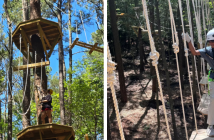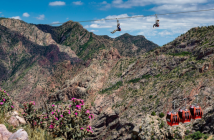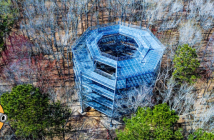Well-prepared staff are an important part of an adventure program, and training is a major part of the equation of readying staff to work with the public. Still, it’s equally important to create a smooth transition between training and working with guests. A strong mentoring program can help you manage this transition and create more “polished” staff members.
At ZipZone Outdoor Adventures in Columbus, Ohio, our “fieldwork” program is an extension of our training program. After new staff complete their initial training, they work with an experienced staff member on the course to learn the ins and outs of being a zip line guide or adventure park monitor. The senior staff serve as mentors during the fieldwork portion of the training, providing subtle direction to the new hires during tours and offering feedback afterward.
Importantly, we don’t refer to fieldwork as “shadowing,” because that implies the new staff person might be following along or observing a senior staff member. Instead, our fieldwork program allows the new staff person to act as the lead, and the senior staffer is there to provide support as needed. This way, the new guide or monitor can work with the guests and still feel comfortable knowing that someone with more experience is right there.
DEVELOPING THE MENTORS
For fieldwork to be successful, we must first develop senior staff to work with trainees during a tour. To become a mentor, senior guides and monitors need a minimum of 300 hours of experience, and at least one year of work on our course. Mentors must also show they are leaders as well as good mentors for less experienced staff; they must complete a short training focused on leadership, how best to make corrections while on the course, and how to provide feedback.
There’s a definite method to our program. For example, if a new guide omits a piece of the guest instructions, a senior staff person is taught to repeat a small section of what the new guide included, then add the part that was left out. This technique makes it seem more like collaboration rather than correction (to both the new guide and the guests).
Further, since our senior staff often assist with new-hire training, the trainees may already be familiar with the person joining them for fieldwork.
Our senior staff are also trained in how to discuss the “extra” staff person with the guests. For example, we recommend that a zip tour guide team introduces all staff members as guides, and never call out that anyone is new. New staff can use terms like “this is my first season” instead of “I am new” or “this is my first tour.” We try not to draw attention to the fieldwork so that guests feel confident in their guide team or monitors.
For our zip tours during fieldwork, all staff involved are instructed to act as if it is a natural occurrence to have three guides on a tour. If a guest questions that, we explain that the three-guide format is a regular part of our program to learn from each other.
The new guide typically takes the lead role on the tour during fieldwork, and the start of the tour might sound something like this: “Hey everyone, welcome to the 11:00 tour, my name is Susie, and this is Jim and that is Jane. We are going to be your guides today.” Simple as that.
DEVELOPING THE TRAINEES
Staff at ZipZone must complete their fieldwork and proficiently demonstrate key skills on a written checklist before they are ready to be a lead guide or monitor. Most trainees will need to complete at least two fieldwork tours to fully demonstrate the necessary skills. Occasionally, a trainee will need to participate in more tours to complete the worksheet and feel comfortable guiding on their own. If it has been more than two weeks since their initial training, they also must practice their lowering and retrieval skills before they can be checked off to guide as part of a two-person team.
After each fieldwork tour, the senior guide meets with the trainee to debrief and give feedback about their performance to help them improve. We adjust our schedule for our tours during fieldwork and add an extra 30 minutes so that mentors and trainees have time to meet and discuss performance and fill out the necessary paperwork before the next tour starts.
To track a trainee’s progress and skills, senior guides have a worksheet that lists the skills for new staff to complete throughout the fieldwork process. Key skills are marked on the sheet as required and must be completed on one of the fieldwork tours. There is also room for comments, and a sign-off area for when fieldwork is completed.
Fieldwork is a great way to ensure new staff bridge the gap between learning skills during training and applying those skills while working with guests. It also serves as a way for new staff to develop relationships with experienced staff, further build trust in each other, and make trainees more comfortable with asking questions along the way.
If you are not yet implementing a fieldwork program and want to start, you could use a skill verification or skill audit sheet as a guideline for the skills you want new staff to demonstrate. Once identified, you can develop your fieldwork skill sheet to guide you through the development of the program.






